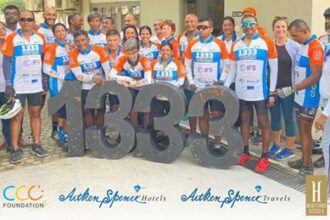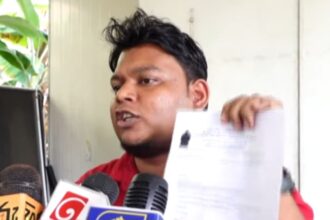During his recent visit to Sri Lanka, Dr. Christos Christou, International President of Médecins Sans Frontières (MSF), spoke with Newswire about the country’s current public health landscape and MSF’s future engagement in the region. His visit, alongside senior MSF South Asia officials, marked a key moment in strengthening cooperation with Sri Lanka’s Ministry of Health. Notably, the trip coincided with the hosting of MSF’s International General Assembly in Colombo—the first time this global event was held in Sri Lanka.
In this interview, Dr. Christou addresses the health challenges facing the country in the aftermath of its economic crisis, the rising mental health burden, climate preparedness, and MSF’s role in supporting a strained healthcare system amid a growing exodus of medical professionals.
1. Sri Lanka is emerging from a period of economic and political instability, but the impact on its public health system can be felt. Based on MSF’s experience in fragile settings, what lessons or models could be applied here to build a more resilient healthcare system?
We’ve worked in some of the world’s most fragile contexts—conflict zones, post-disaster regions, health systems on the brink of collapse. The harsh reality? Resilience isn’t just about infrastructure or financing. It’s about whether people can actually access care when they need it most.
MSF isn’t here to replace national health systems. But our decades of experience in emergency contexts have taught us this—the difference between a manageable crisis and a health catastrophe comes down to preparedness.
From our experience, here’s what works:
Decentralize care: Rural and underserved communities get left behind every time. In emergencies, access to remote communities becomes even more challenging. This is why mapping and understanding remote community vulnerabilities is key, as well as strengthening basic care systems closer to communities, with solid referral pathways. This isn’t optional—it’s essential.
Don’t sacrifice the essentials: In fragile settings, we’ve seen that maternal health, chronic disease treatment, and mental health support could sometimes be sidelined. Delayed access to such services can lead to severe and sometimes life-threatening health complications. They’re lifesaving services that must continue, even during economic hardship.
Be prepared: Climate disasters, disease outbreaks can occur any time. Health systems need protocols, mapping of vulnerable communities, contingency stocks, and community awareness built in, not bolted on afterward.
During my visit, I met with Ministry of Health officials. We support the efforts to strengthen Sri Lanka’s public health mapping alert system, collaborate with Sri Lankan medical academia on building regional climate health capacity. This helps focus on what matters, which is health system resilience, equitable access and emergency preparedness.
2. How can a country like Sri Lanka grappling with its own post-conflict legacy—better integrate mental health and trauma care into mainstream medical services?
Providing care for mental health isn’t a luxury—it’s a vital component of any resilient health system. Yet it’s frequently overlooked, even in contexts where trauma is widespread. But we’ve found that even in the hardest-hit environments, quality mental health care is possible.
In most post crisis contexts, the trauma is shared and becomes socially entrenched. Therefore, our teams witness good results from raising community awareness on mental health, and providing group therapy sessions that encourage people to reflect on their experience and reduce stigma. This enables the team of psychiatrists and psychologists to also focus on patients who suffer the most urgent mental health issues and create treatment plans for them.
Embed it everywhere: In post-conflict settings like Sri Lanka, mental health can’t be a separate service. It needs to be part of basic healthcare, maternity care, and chronic disease management. Our experience showed better mental health leads to better medical results, and in many cases basic healthcare becomes an entry point to seek mental health care because of social stigma. We’ve done this successfully in Bangladesh, Pakistan, India and other contexts—mental health is part of general medical consultations.
Fight stigma directly: Integration requires health promotion messaging that destigmatizes mental illness and helps patients recognizes trauma as a legitimate medical condition.
3. Given the rise in climate-related disasters and disease outbreaks across South Asia, how is MSF preparing for the intersection of health and climate crises—and what are the implications for island nations like Sri Lanka?
As a humanitarian organization, MSF responds to different kinds of emergencies. Including climate disasters. Our teams were among the first responders to the 2004 Tsunami, as well as Typhoon Haiyan/ Yolanda. We hope that a similar disaster does not happen again, but our global emergency teams are ready to mobilize in case of any emergency.
That said, we recognize that preparedness matters, and that climate-related health issues go way beyond disasters. Climate change isn’t a future threat—it’s a health emergency we’re confronting right now in our medical projects across South Asia. In Bangladesh, Pakistan, India, we’re witnessing direct health impacts: more frequent floods, heatwaves, droughts, vector-borne diseases.
For MSF, climate and health are inseparable. In early 2025, we hosted a Climate and Health Roundtable in Colombo, bringing together national climate scientists, disaster response actors, public health experts. The goal was better preparation and response to increasing health impacts of climate change in South Asia.
Our climate health approach includes:
Adapt medical responses to climate realities: In flood-prone Pakistan for example, we’ve tailored operations with clinics, outbreak preparedness, rapid response teams trained in waterborne disease management.
Build understanding of climate related health issues: The relation between climate change and health issues is well documented. We aim to sensitize health actors in the region on health issues that have recently aggravated because of climate change. This will help healthcare providers be prepared with knowledge and response in cases of disease outbreak. For example, climate-sensitive diseases like dengue and malaria are rising. Heat stress also causes complications to pregnant women and people suffering from chronic diseases.
Prioritize surveillance and early warning: Building understanding of vulnerable communities and service mapping becomes vital information when a climate crisis hits. Alert systems also prevent disease outbreaks from becoming extensive. We support data-driven approaches and community-based health surveillance in hotspots to catch outbreaks early.
Include frontline communities: MSF in South Asia believes in nurturing and building on local expertise on tackling climate issues. Communities in Sri Lanka and across South Asia have very good initiatives for climate change mitigation and adaptation. We’re working to ensure these experiences are interlinked and enhanced for preparedness and emergency response.
For countries like Sri Lanka, the implications are stark: rising sea levels, changing disease patterns, and climate-induced displacement could severely strain health systems. That’s why we believe in collaborative preparedness—integrating disaster response, mental health, and climate adaptation into health policy core.
MSF cannot affect the climate events that cause escalating health crises, so we focus on responding and integrating sustainable health services: strengthening disease surveillance for climate-intensified outbreaks like dengue and cholera, developing solar-powered health infrastructure for continuity in off-grid or disaster-hit areas where MSF works, and building more efficient supply chains to reduce carbon footprint.
4. With Sri Lanka’s brain drain in healthcare growing rapidly, what role do you think international organisations like MSF can play in supporting local medical professionals?
International organizations like MSF can play a meaningful role, but while we can complement and support national efforts, we don’t replace them.
Our experience in fragile contexts shows the value of investing in local capacity and reinforcing health system resilience through technical exchange, mentoring, and strategic support. By engaging with local professionals and institutions, MSF in South Asia contribute to skill development and retention, particularly in emergency preparedness, mental health integration, crisis response.
Our decision to establish the South Asia regional headquarters in Sri Lanka reinforces the country’s growing role as a knowledge-sharing and training hub for humanitarian and medical expertise. This positioning enables better regional program coordination and stronger partnerships across South Asia.
In Sri Lanka, we’re developing platforms like the Global Health and Humanitarian Medicine (GHHM) course, which equips medical professionals with practical skills for crisis contexts. Sri Lanka serves as a key recruitment and training base for MSF’s International Mobile Staff—medical professionals sent to projects globally. This creates dynamic exchange where local expertise elevates internationally, and global insights integrate back into local practice.
This dual role doesn’t just support health workers—it contributes to building a stronger, more resilient healthcare ecosystem in the region.
5. How do you see the role of communication and media in upholding humanitarian principles—especially neutrality and independence—in South Asia’s polarized environments?
Communication and media are crucial for safeguarding humanitarian principles in complex, polarized environments. In humanitarian work, neutrality, impartiality, independence aren’t just values—they’re operational necessities.
Upholding these principles requires clear, credible, transparent communication that builds trust with affected communities, host governments, other stakeholders.
At MSF, communication isn’t just a tool—it’s humanitarian engagement. Our “témoignage” (bearing witness) approach, speaking out about on the ground realities, exposes neglected crises and advocates for people affected by violence, exclusion, disaster.
Media plays a vital role in combating health misinformation and disinformation, which quickly undermine public health responses and lead to fear, stigma, and poor health outcomes. It sheds light on silent, forgotten health emergencies, pushing these issues onto public and policy agendas.
Our South Asia Regional Office implements an annual Media Fellowship, now in its 5th edition, collaborating with journalists to enhance in-depth, ethical reporting on underreported health and humanitarian issues. The fellowship promotes fact-based storytelling, builds bridges between field realities and public understanding, contributes to preserving space for principled humanitarian action—especially where truth is contested or politicized.
6. Are there any MSF-driven innovations—(technological/procedural/anthropological innovations) that you believe could be effectively adopted in Sri Lanka’s healthcare landscape?
We’ve tested several innovations in crisis settings that could strengthen Sri Lanka’s healthcare system in routine and emergency scenarios:
Safe Water Optimization Tool (SWOT): Machine-learning based tool originally developed to prevent waterborne disease outbreaks in refugee camps. It adapts water-quality guidelines based on local contexts—ideal for Sri Lanka’s vulnerable rural and disaster-prone areas.
Antibiogo mobile app: Smartphone-driven AI tool that reads antibiotic susceptibility tests, supports non-specialist clinicians in making informed antibiotic prescriptions. Critical for combatting antimicrobial resistance in under-resourced labs.
Telehealth toolkit & services: Our telemedicine platforms have provided real-time remote consultations in low-bandwidth settings since 2009. Standardized toolkit enables Sri Lankan providers to consult specialists, expanding reach to remote and underserved areas.
Solar-powered hybrid cooling and energy systems: From hospitals in Sierra Leone and Somalia to remote clinics globally, our solar AC and hybrid energy systems ensure continuity during power outages—relevant for Sri Lanka’s rural healthcare infrastructure.
These innovations can offer Sri Lanka practical, scalable solutions: improving water safety, enabling antibiotic stewardship, expanding specialist care through telehealth, enhancing infrastructure resilience. (Newswire)
The post Sri Lanka emerging as a knowledge-sharing & training hub for medical expertise : MSF President appeared first on Newswire.




